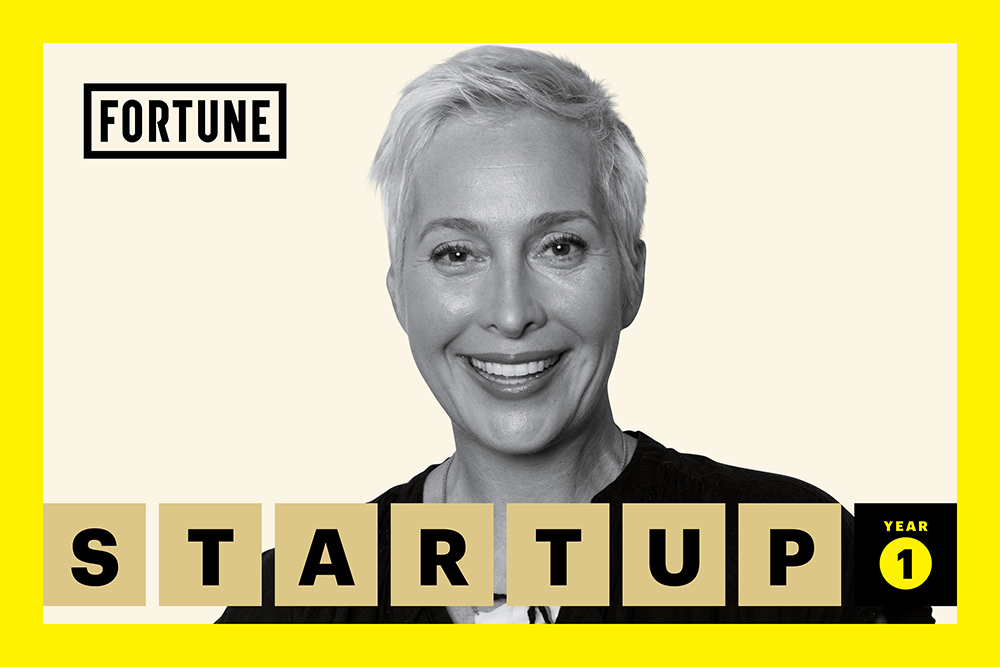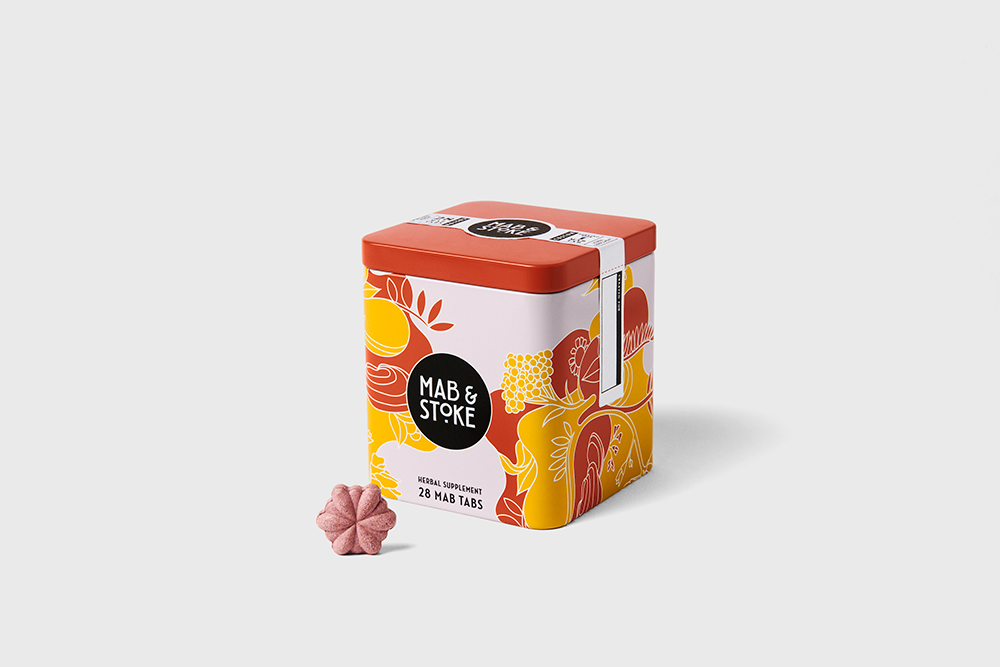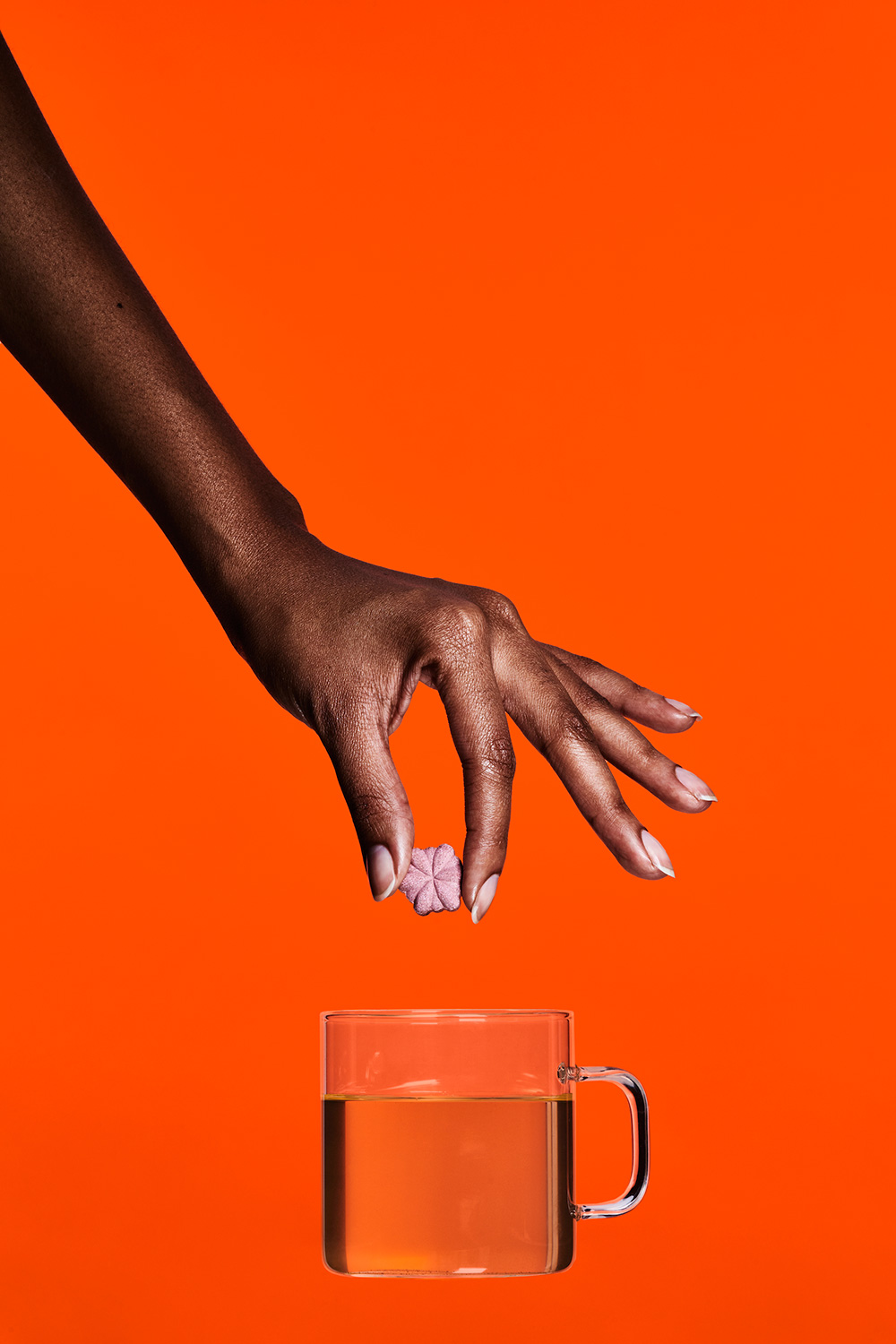克里斯蒂娜·麦克-特纳在开启律师生涯后,很快就意识到法律不适合她。麦克-特纳本质上是一个富有创造力的人,于是在2008年改变方向,加入了苹果公司,在将近四年的时间里,先后负责全球商业事务和内容战略。离开苹果后,她在Flipboard牵头了两年伙伴关系部,带领团队规划、发展、落实了与iTunes、维亚康姆(Viacom)、《纽约时报》(New York Times)和康泰纳仕(Condé Nast)全球重要合作伙伴的关系。
尽管这些工作让她在职场上收获颇丰,但麦克-特纳还是想自己创业。2016年,她与人共同创立了天然护肤品牌True Botanicals,经手了三轮融资后,在2018年秋季退出。
之后,麦克-特纳又在2019年创立了一家新的保健公司Mab & Stoke,生产为客户量身定制的片状草本补充剂。最近,她接受了《财富》杂志的采访,聊了聊她的职业生涯、新公司以及这家已经成立了一年的新公司未来的前景。
为简明起见,以下采访内容经过了经过删减和编辑。

《财富》:保健行业比以往任何时候都更炙手可热,但也很拥挤。而且口服产品的有效性还存在很多问题。创立Mab & Stoke的灵感是什么?是什么让它与众不同?
克里斯蒂娜·麦克-特纳:说实话,当我离开True Botanicals公司时,完全没有再开一家公司的打算,尤其是一家健康领域的公司。殚精竭虑的创业生活把我彻底累坏了。但讽刺的是,正是这种疲劳催生了Mab & Stoke。为了缓解疲劳,我开始研究各种各样的草本保健品,等我真正找到适合我的种类、适合我的剂量时,我被效果彻底惊艳了。后来我根据自己的需求每天服用适合我的草本保健品,效果之明显,是我在尝试草本保健的这些年里从来没有感受过的。
我听到过很多人质疑口服产品的功效,虽然可能对某一种产品来说确实有这个问题,但在我看来,一杆子打翻一整类产品是毫无道理的。我认为,人们是通过行为来理解和相信事物的。不需要有人向你证明一杯水可以解渴,因为每个人都有过亲身体验。不过,就像一滴水不足以补充水分一样,在拿铁里加一两勺植物粉也无法让你感受到到草本的最佳功效。如果你想要实现目标效果,就需要按照正确的频率和剂量服用正确的植物。我认为大多数人从来没有弄明白真正符合他们需求的植物是什么,而且即使他们弄明白了,也很少能够摄入足够产生明显效果的剂量。再加上,按照我们美国人如今的生活方式,很少有人可以做到一天吃三顿补剂,而想要植物补充剂起作用,则需要一天三次最传统的服用频率。
有时我觉得,人们之所以会质疑植物的功效,是因为药用植物的种类如此丰富,又如此唾手可得。然而,事实上,植物是非常复杂的。比水复杂得多,水只有两份氢和一份氧。例如,生姜由700多种化合物组成,而且不像维生素,这些化合物大多数都和人体化合物不同。生姜里的化合物共同作用,可以缓解疼痛、辅助消化、提升皮肤健康以及其他多种好处。没有临床实验证明这些化合物是如何共同发挥作用的,因为让制药公司去证明生姜作为一种植物的功效实在无利可图。你又不能给生姜打上自己的专利。总而言之,我觉得认为草药没有效果的想法非常愚昧。世界上80%的人成功依靠草药作为其主要医用药物,还把草药和对抗疗法结合使用。国外的医生通常都要接受植物药方面的培训。在美国,植物药不够主流,这更多地反映了监管政治,而不能说明植物是否真能帮助人们过上更健康的生活。
我之所以创造出Mab Tabs,因为我想和大家分享植物让我感觉生机勃勃、充满力量的个人体验,要知道,这之前我已经很多年没有过这种体验了。我想生产点我妈妈、丈夫和朋友都愿意服用的东西。我知道他们一天最多只可能吃上一回,而且我想,这种产品的服用体验可要比胶囊或苦味酊剂吸引人。最重要的是,我想创造一种足够强效的产品,吃一片水溶片就能够获取一整天需要的全部草药成分。

一开始我做研究更多是出于好奇心,而不是想再创业。我开始接触这个领域的专家、植物化学家、医学博士、植物学家和农民,结果,我开始考虑能不能获得一种完美的体验——生产一种超级草药片,结构更高级,可以向你提供你真正需要的东西。我了解到,植物的功效并不仅仅取决于植物从哪里来,也取决于它们的产地和生产方式。深入参与从农民到终端产品的供应链,对确保产品有最佳效果也至关重要。
之所以会出现Mab Tabs,是因为我在市面上找不到类似的产品;但我觉得它们的存在真正可以对服用者的健康产生积极影响。Mab Tabs确实是一款独特的产品。我们为大多数顾客提供的都是定制产品,我们还提供有针对性的混合药剂,既能在短期内明显见效(比如Focus或Calm),长期服用也可以产生持续影响。我们的每一种混合补充剂都是精心制作,将6到10种产品进行浓缩合一,最终产生的水溶片能够随意加入你的早餐咖啡,你最喜欢的鸡尾酒,或者就是加到水壶里。
你在创业时遇到的最大困难是什么?最让你感到惊讶的是什么?
我们是在2020年1月下旬开始营业的,当然,新冠肺炎疫情是个大意外。疫情带来了各种各样我们没有预见的问题和挑战。其中一个是关于如何应对消费市场的重大转变,包括现在消费者更关注常用商品(面粉、卫生纸等)。其他挑战包括如何将经济包容性作为我们产品的长期目标,如何建立一个可以反映我们所有目标顾客群体需求的社区。
当我创建Mab & Stoke的时候,我的目标是创建一家让人们感觉很棒的公司。我们都希望并应该拥有健康,但经济差距是导致人们难以实现共同健康的巨大障碍。这并不是什么新鲜事,但从全球疫情的角度来看,我意识到我们过去的产品定位是“负担得起”的奢侈品。
尽管如此,在超过5100万人失业的情况下,这是我们给自己设了个陷阱,如果不重新思考定价问题,将极大地影响我们的成功。我们最初的启动策略是为志同道合的客户建立一个社区,却没有考虑到现有商业模式相对于经济可及性的长期影响。
因此,面世五个月后,我们推出了“量入为出”模式。我们大幅削减了利润率,现在为所有产品提供三个层级的可变价格,确保每个人都能够买得起Mab Tabs。我们为这个策略感到十分自豪,但如果不是疫情,这也许不会出现。

你们从客户那里收到了哪些反馈?你是否发现有哪些需要迅速调整的地方?
我们的“量入为出”计划得到了广泛好评,这让我们颇为惊讶。客户不仅非常喜欢这个模式,而且他们也可以不用考虑经济因素更随心地向亲朋好友推荐我们的产品了。因此,我们的订购率在该模式推出后的第一个月就飙升714%,并在第二个月继续保持良好的增长势头。从利润率的角度来看,这个计划也完全行得通,因为有两个高价选项,能够保证最低层级定价的供给(基本上是成本价)。在前两层中,每卖出10件产品,就可以补足一件最低价商品的差价。换句话说,我们的社区是由顾客自行补贴的,他们选择了自己需要的东西,同时享受在社区中为他人提供支持的感觉。
在这个项目中,我们还测试过一个许多客户都提出过的方案,他们要求我们增加第四层订阅价,这层价格要高于我们常规的零售价格;选择这种定价可以回馈社会,能够创造更多的低价产品。我们想为什么不试试呢?我们按照订阅价130%的价格测试了大约一个月,但没有什么人感兴趣,所以我们就中止了这个方案。理论上,第四层价格对于人们来说或许很好,但当它真正出现时,即使是那些拥有更多资源的人也不想为产品付那么多钱。我发现,互联网企业经常会遇上这种变化。人们说他们想要某个功能,但等你做出来了,他们却不一定会用。未来我们可能会在这个领域进行更多试验,但目前我们回到了三层定价方案。

在疫情和经济危机的背景下,当前的商业和公共卫生环境将如何影响企业的未来,包括产品开发、筹资等?
对我们来说,最重要的就是专注于继续教育,为客户提供最好的产品。我们将继续做消费者直营,但也开始和一些重要的伙伴进行合作,目的是扩大我们的经销范围,到时你就能够看到添加了Mab & Stoke成分的产品。这些合作远远超出了饮料领域,拓展到了许多令人激动的品类。基本上,只要某种产品的性能可以通过植物得到提升,我们在就有可能在未来建立伙伴关系,开展合作。
展望未来五年,你希望Mab & Stoke是什么样子?你希望它处于哪个位置?
我先不透露太多,Mab & Stoke的目标一直都是生产Mab Tabs。但这仍然是一个起点,而不是终点。除了Mab Tabs,如果有哪种以植物为原料的产品可以有效果,还能以现代化的形式交付,我们就会把它纳入视野。我们正在打造未来的消费性包装品公司;这是一家关心环境和他人健康的公司,是一家以植物作为源动力的公司。(财富中文网)
译者:Agatha
克里斯蒂娜·麦克-特纳在开启律师生涯后,很快就意识到法律不适合她。麦克-特纳本质上是一个富有创造力的人,于是在2008年改变方向,加入了苹果公司,在将近四年的时间里,先后负责全球商业事务和内容战略。离开苹果后,她在Flipboard牵头了两年伙伴关系部,带领团队规划、发展、落实了与iTunes、维亚康姆(Viacom)、《纽约时报》(New York Times)和康泰纳仕(Condé Nast)全球重要合作伙伴的关系。
尽管这些工作让她在职场上收获颇丰,但麦克-特纳还是想自己创业。2016年,她与人共同创立了天然护肤品牌True Botanicals,经手了三轮融资后,在2018年秋季退出。
之后,麦克-特纳又在2019年创立了一家新的保健公司Mab & Stoke,生产为客户量身定制的片状草本补充剂。最近,她接受了《财富》杂志的采访,聊了聊她的职业生涯、新公司以及这家已经成立了一年的新公司未来的前景。
为简明起见,以下采访内容经过了经过删减和编辑。
《财富》:保健行业比以往任何时候都更炙手可热,但也很拥挤。而且口服产品的有效性还存在很多问题。创立Mab & Stoke的灵感是什么?是什么让它与众不同?
克里斯蒂娜·麦克-特纳:说实话,当我离开True Botanicals公司时,完全没有再开一家公司的打算,尤其是一家健康领域的公司。殚精竭虑的创业生活把我彻底累坏了。但讽刺的是,正是这种疲劳催生了Mab & Stoke。为了缓解疲劳,我开始研究各种各样的草本保健品,等我真正找到适合我的种类、适合我的剂量时,我被效果彻底惊艳了。后来我根据自己的需求每天服用适合我的草本保健品,效果之明显,是我在尝试草本保健的这些年里从来没有感受过的。
我听到过很多人质疑口服产品的功效,虽然可能对某一种产品来说确实有这个问题,但在我看来,一杆子打翻一整类产品是毫无道理的。我认为,人们是通过行为来理解和相信事物的。不需要有人向你证明一杯水可以解渴,因为每个人都有过亲身体验。不过,就像一滴水不足以补充水分一样,在拿铁里加一两勺植物粉也无法让你感受到到草本的最佳功效。如果你想要实现目标效果,就需要按照正确的频率和剂量服用正确的植物。我认为大多数人从来没有弄明白真正符合他们需求的植物是什么,而且即使他们弄明白了,也很少能够摄入足够产生明显效果的剂量。再加上,按照我们美国人如今的生活方式,很少有人可以做到一天吃三顿补剂,而想要植物补充剂起作用,则需要一天三次最传统的服用频率。
有时我觉得,人们之所以会质疑植物的功效,是因为药用植物的种类如此丰富,又如此唾手可得。然而,事实上,植物是非常复杂的。比水复杂得多,水只有两份氢和一份氧。例如,生姜由700多种化合物组成,而且不像维生素,这些化合物大多数都和人体化合物不同。生姜里的化合物共同作用,可以缓解疼痛、辅助消化、提升皮肤健康以及其他多种好处。没有临床实验证明这些化合物是如何共同发挥作用的,因为让制药公司去证明生姜作为一种植物的功效实在无利可图。你又不能给生姜打上自己的专利。总而言之,我觉得认为草药没有效果的想法非常愚昧。世界上80%的人成功依靠草药作为其主要医用药物,还把草药和对抗疗法结合使用。国外的医生通常都要接受植物药方面的培训。在美国,植物药不够主流,这更多地反映了监管政治,而不能说明植物是否真能帮助人们过上更健康的生活。
我之所以创造出Mab Tabs,因为我想和大家分享植物让我感觉生机勃勃、充满力量的个人体验,要知道,这之前我已经很多年没有过这种体验了。我想生产点我妈妈、丈夫和朋友都愿意服用的东西。我知道他们一天最多只可能吃上一回,而且我想,这种产品的服用体验可要比胶囊或苦味酊剂吸引人。最重要的是,我想创造一种足够强效的产品,吃一片水溶片就能够获取一整天需要的全部草药成分。
一开始我做研究更多是出于好奇心,而不是想再创业。我开始接触这个领域的专家、植物化学家、医学博士、植物学家和农民,结果,我开始考虑能不能获得一种完美的体验——生产一种超级草药片,结构更高级,可以向你提供你真正需要的东西。我了解到,植物的功效并不仅仅取决于植物从哪里来,也取决于它们的产地和生产方式。深入参与从农民到终端产品的供应链,对确保产品有最佳效果也至关重要。
之所以会出现Mab Tabs,是因为我在市面上找不到类似的产品;但我觉得它们的存在真正可以对服用者的健康产生积极影响。Mab Tabs确实是一款独特的产品。我们为大多数顾客提供的都是定制产品,我们还提供有针对性的混合药剂,既能在短期内明显见效(比如Focus或Calm),长期服用也可以产生持续影响。我们的每一种混合补充剂都是精心制作,将6到10种产品进行浓缩合一,最终产生的水溶片能够随意加入你的早餐咖啡,你最喜欢的鸡尾酒,或者就是加到水壶里。
你在创业时遇到的最大困难是什么?最让你感到惊讶的是什么?
我们是在2020年1月下旬开始营业的,当然,新冠肺炎疫情是个大意外。疫情带来了各种各样我们没有预见的问题和挑战。其中一个是关于如何应对消费市场的重大转变,包括现在消费者更关注常用商品(面粉、卫生纸等)。其他挑战包括如何将经济包容性作为我们产品的长期目标,如何建立一个可以反映我们所有目标顾客群体需求的社区。
当我创建Mab & Stoke的时候,我的目标是创建一家让人们感觉很棒的公司。我们都希望并应该拥有健康,但经济差距是导致人们难以实现共同健康的巨大障碍。这并不是什么新鲜事,但从全球疫情的角度来看,我意识到我们过去的产品定位是“负担得起”的奢侈品。
尽管如此,在超过5100万人失业的情况下,这是我们给自己设了个陷阱,如果不重新思考定价问题,将极大地影响我们的成功。我们最初的启动策略是为志同道合的客户建立一个社区,却没有考虑到现有商业模式相对于经济可及性的长期影响。
因此,面世五个月后,我们推出了“量入为出”模式。我们大幅削减了利润率,现在为所有产品提供三个层级的可变价格,确保每个人都能够买得起Mab Tabs。我们为这个策略感到十分自豪,但如果不是疫情,这也许不会出现。
你们从客户那里收到了哪些反馈?你是否发现有哪些需要迅速调整的地方?
我们的“量入为出”计划得到了广泛好评,这让我们颇为惊讶。客户不仅非常喜欢这个模式,而且他们也可以不用考虑经济因素更随心地向亲朋好友推荐我们的产品了。因此,我们的订购率在该模式推出后的第一个月就飙升714%,并在第二个月继续保持良好的增长势头。从利润率的角度来看,这个计划也完全行得通,因为有两个高价选项,能够保证最低层级定价的供给(基本上是成本价)。在前两层中,每卖出10件产品,就可以补足一件最低价商品的差价。换句话说,我们的社区是由顾客自行补贴的,他们选择了自己需要的东西,同时享受在社区中为他人提供支持的感觉。
在这个项目中,我们还测试过一个许多客户都提出过的方案,他们要求我们增加第四层订阅价,这层价格要高于我们常规的零售价格;选择这种定价可以回馈社会,能够创造更多的低价产品。我们想为什么不试试呢?我们按照订阅价130%的价格测试了大约一个月,但没有什么人感兴趣,所以我们就中止了这个方案。理论上,第四层价格对于人们来说或许很好,但当它真正出现时,即使是那些拥有更多资源的人也不想为产品付那么多钱。我发现,互联网企业经常会遇上这种变化。人们说他们想要某个功能,但等你做出来了,他们却不一定会用。未来我们可能会在这个领域进行更多试验,但目前我们回到了三层定价方案。
在疫情和经济危机的背景下,当前的商业和公共卫生环境将如何影响企业的未来,包括产品开发、筹资等?
对我们来说,最重要的就是专注于继续教育,为客户提供最好的产品。我们将继续做消费者直营,但也开始和一些重要的伙伴进行合作,目的是扩大我们的经销范围,到时你就能够看到添加了Mab & Stoke成分的产品。这些合作远远超出了饮料领域,拓展到了许多令人激动的品类。基本上,只要某种产品的性能可以通过植物得到提升,我们在就有可能在未来建立伙伴关系,开展合作。
展望未来五年,你希望Mab & Stoke是什么样子?你希望它处于哪个位置?
我先不透露太多,Mab & Stoke的目标一直都是生产Mab Tabs。但这仍然是一个起点,而不是终点。除了Mab Tabs,如果有哪种以植物为原料的产品可以有效果,还能以现代化的形式交付,我们就会把它纳入视野。我们正在打造未来的消费性包装品公司;这是一家关心环境和他人健康的公司,是一家以植物作为源动力的公司。(财富中文网)
译者:Agatha
After launching a career as an attorney, Christina Mace-Turner quickly realized that law wasn’t for her. A creative person at heart, Mace-Turner shifted gears in 2008 and joined Apple, where she led global business affairs and then content strategy for nearly four years. After Apple, she spent two years as head of partnerships at Flipboard, where her team planned, developed, and implemented key global partnerships with the likes of iTunes, Viacom, the New York Times, and Condé Nast.
Though these positions proved professionally rewarding, Mace-Turner says she wanted to start a business of her own. So in 2016 she cofounded natural skin-care line True Botanicals, overseeing three rounds of financing before exiting in the fall of 2018.
Mace-Turner has since moved on to launch another wellness company, Mab & Stoke, which produces custom herbal supplements tabs, in 2019. She recently spoke with Fortune about her career, her new company, and what the future looks like after completing the startup’s first year in business.
The following interview has been condensed and lightly edited for clarity.
Fortune: The wellness industry is hotter than ever, but it’s also crowded. There are also a lot of questions about the effectiveness of ingestible products. What inspired the launch of Mab & Stoke? What makes it stand apart?
Christina Mace-Turner: Honestly, when I left True Botanicals, I had absolutely no intention of starting another company, particularly in the “wellness” world. I was completely burnt out on the grueling hours of startup life. But, ironically, that was what inspired Mab & Stoke. I looked to herbal medicine to help relieve my fatigue, and once I figured out what herbs I should be taking and in what amounts, I was absolutely blown away by the results. In all of my years of dabbling in herbal remedies, I had never experienced the level of impact and efficacy that I did once I got into a daily routine of ingesting the appropriate herbs for my needs.
I’ve heard a lot of people question the efficacy of ingestible products, and while that makes sense on a product by product basis, it doesn’t make much sense to me for the category as a whole. I think people believe and understand things by doing. No one needs to prove to you that a glass of water will quench your thirst, because everyone has experienced that result firsthand. But just as it takes more than a drop of water to rehydrate a person, it also takes more than a scoop or two of plant powder in your latte to experience a plant’s optimal benefits. And if you want targeted results, it needs to be the right plants in a very specific amount with a regular frequency. I think most people never get the correct plants for their needs, or if they do, they rarely ingest enough of them to lead to a perceivable impact. Complicating matters further, our modern lifestyles in the U.S. rarely accommodate the frequency with which most traditional plant supplements need to be taken to be effective, often three times per day.
Sometimes I think people question plant efficacy because so many medicinal plants are so abundant and readily available. The reality, though, is that plants are incredibly complex. Far more complex than water—two parts hydrogen and one part oxygen. Ginger, for example, is made up of over 700 individual compounds, most of which do not mimic compounds found in the human body, as vitamins do. The synergistic effect of these compounds when ingested is pain relief, digestive support, skin health, and numerous other benefits. We don’t know how all of these compounds work together through clinical trials, because there is so little in it for the drug companies to prove out the efficacy of ginger as a whole plant. You can’t get a patent on ginger. At the end of the day, to suggest that plant medicine is not efficacious feels pretty silly to me. Eighty percent of the world successfully relies on plant medicine for its primary health care and uses it in conjunction with allopathic medicine. Medical doctors outside the U.S. are routinely trained in plant medicine. The fact that plant medicine is not the norm in the United States is more a reflection of regulatory politics than whether or not plants actually work to help people live healthier lives.
I created Mab Tabs because I wanted to share my personal experience of using plants to feel wildly alive and empowered in a way I hadn’t in years. I wanted something my mother would take and my husband and friends. I knew that none of them would ever take something more than once a day and that it needed to be a product experience that was way more appealing than a capsule or bitter-tasting tincture. Most importantly, I wanted to create something where the blends were potent enough to deliver a whole day’s serving of all the herbs they should be taking in a single daily dissolvable tablet.
My initial research was really more personal curiosity than wanting to start another startup. I started seeking out experts in the field, phytochemists, MDs, botanists, and farmers, and, as a result, started contemplating an ideal supplement experience—an herbal super tab—with an elevated design and far greater likelihood of giving you exactly what you need. I learned that it’s not just a question of where plants come from but how and where they are sourced that determines their efficacy for a particular purpose. Deep involvement with the supply chain from farmer to final product was also essential in producing a product that would provide the optimal benefits.
Mab Tabs came about because I couldn’t find anything like them on the market; yet I felt their existence could make a really positive impact on the wellness of others. Mab Tabs are truly a unique product. We make them custom for most of our customers, and we also offer targeted blends that have both near-term discernible impacts (like Focus or Calm) as well as the long-term benefits that come with cumulative use. Each of our blends are carefully crafted and concentrates the power of six to 10 products in one, and can easily be dropped into your morning coffee, your favorite cocktail, or simply your water bottle.
What were some of the biggest hurdles you faced in launching the business? What surprised you the most?
We launched in late January 2020, and, of course, COVID-19 was a massive surprise. To launch into a pandemic has raised all sorts of questions and challenges that we didn’t see coming. One has been about how best to address the significant shift in the consumer market and the focus on products that feel familiar (flour, toilet paper, etc.). The other has been about economic inclusion as a long-term goal for our products, and how best to build a community that reflects all of the people we want to serve.
When I founded Mab & Stoke, my goal was to create a company to help people feel amazing. We all want and deserve good health, but the economic disparity amongst us is a giant hurdle to collective wellness. That’s not something new, but looking at it in the light of a global pandemic, I realized that we had positioned ourselves in the “affordable” luxury market.
That said, with over 51 million people unemployed, it was a trap set for ourselves and would have massively impacted our success had we not rethought how to address pricing. Our initial launch strategy was aimed at building a community of like-minded customers, but had failed to consider the longer-term implications of existing business models relative to economic accessibility.
As such, five months into our launch we introduced a “pay what you can” model. We slashed our margins and now offer three tiers of variable subscription pricing on all our products to allow everyone access to Mab Tabs. This is something we are very proud of and perhaps wouldn’t have happened if it wasn’t for COVID-19.
What kind of feedback have you received from your customers? Is there anywhere you found you needed to make adjustments quickly?
We’ve been amazed by how universally well received our pay-what-you-can program has been. Not only have our customers been highly enthusiastic about the model, they have felt more comfortable suggesting it to their friends and family regardless of economic means. As a result, we saw our subscription rate shoot up 714% in the first month after launch with continued excellent growth going into month two. The program works from a margins perspective because the lowest tier of pricing (basically at cost) is made possible by purchases in the higher two tiers. For every 10 products sold in the top two tiers, a new product is made available at the third and lowest price tier. In other words, our community is self-subsidized by customers who take what they need and enjoy the feeling of supporting others in the community.
One area of this program that we tested came from a number of customers asking us to add a fourth tier that offered subscriptions at a price above our regular retail pricing; this would be a way to give back even more to the community and create even more of the lowest-priced products. We figured why not try it out? For about one month, we tested 130% subscriptions, but there was little interest, so we turned it off. The fourth tier was likely good in theory for people, but when it came down to it, even those with greater resources didn’t want to pay that much for their products. I have found that Internet-based businesses often have this dynamic at play. People say they want a feature, but when you offer it to them, they don’t necessarily ever use it. We may experiment more in this area in the future, but for now we are back to three levels of pricing.
Given the pandemic and economic crisis, how does the current business and public health environment affect the future of the business, from product development to raising capital?
For us, it’s all about staying focused on continued education and making the very best products possible for our customers. We will continue to do this direct to consumers, but we have also started engaging in a number of key partnerships that will extend the reach of our distribution and where you will start to see products infused by Mab & Stoke. These collaborations extend far beyond beverage collaborations into a number of really exciting categories. Basically, if you can enhance the function of a product with plants, it’s in our field of possibilities for future partnerships and collaborations.
Looking down the road five years or so, what do you want Mab & Stoke to look like? Where do you hope it will be?
Without giving away too much, the goal for Mab & Stoke has always been to launch with Mab Tabs. But that remains a starting place, not a destination. Beyond Mab Tabs, if an efficacious product can be made from plants and delivered in a modern form factor, we have it in our sights. We are building the CPG [consumer packaged goods] company of the future; it’s a company that cares about the environment and the wellness of others, and it’s powered by plants.






